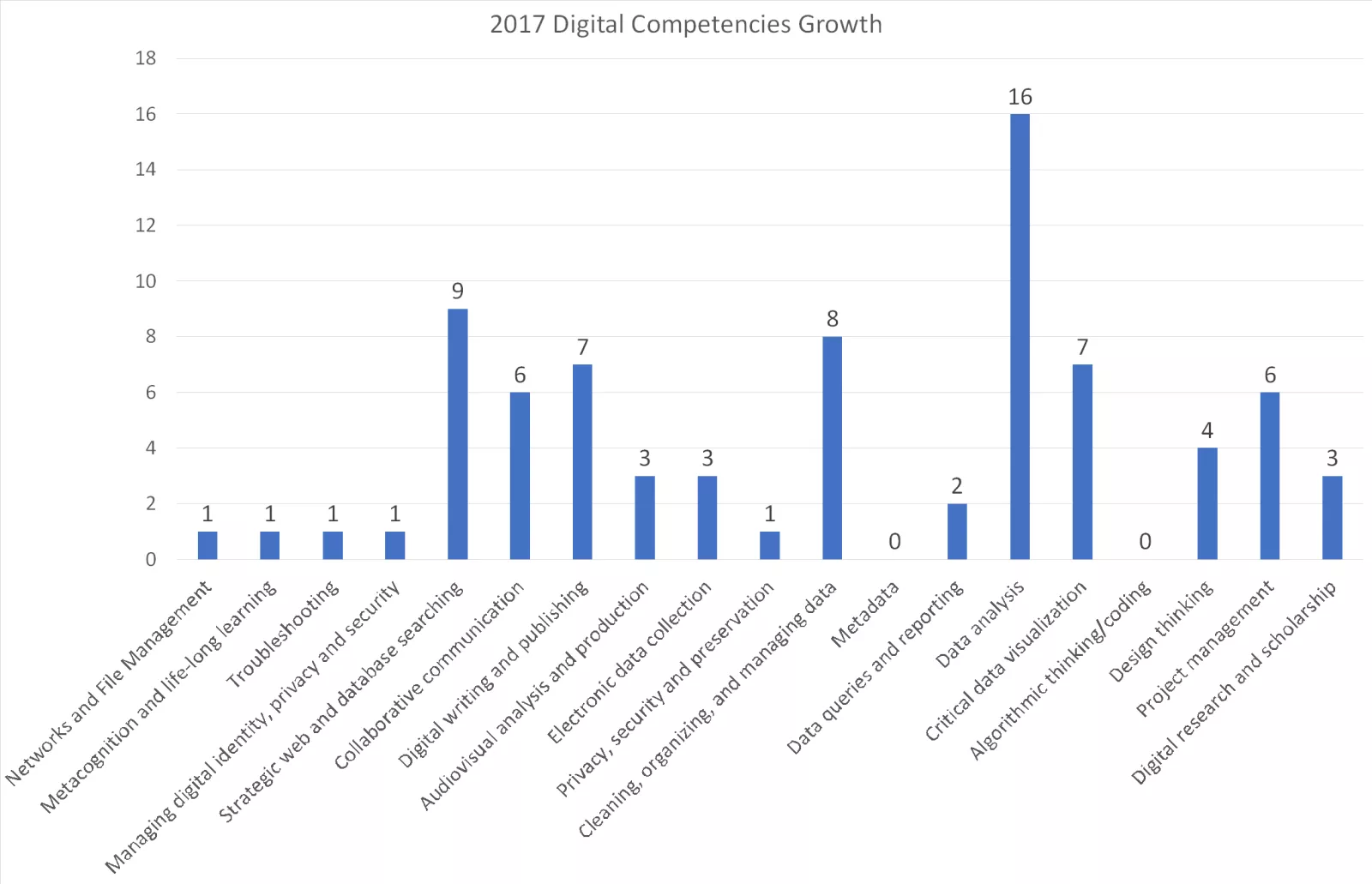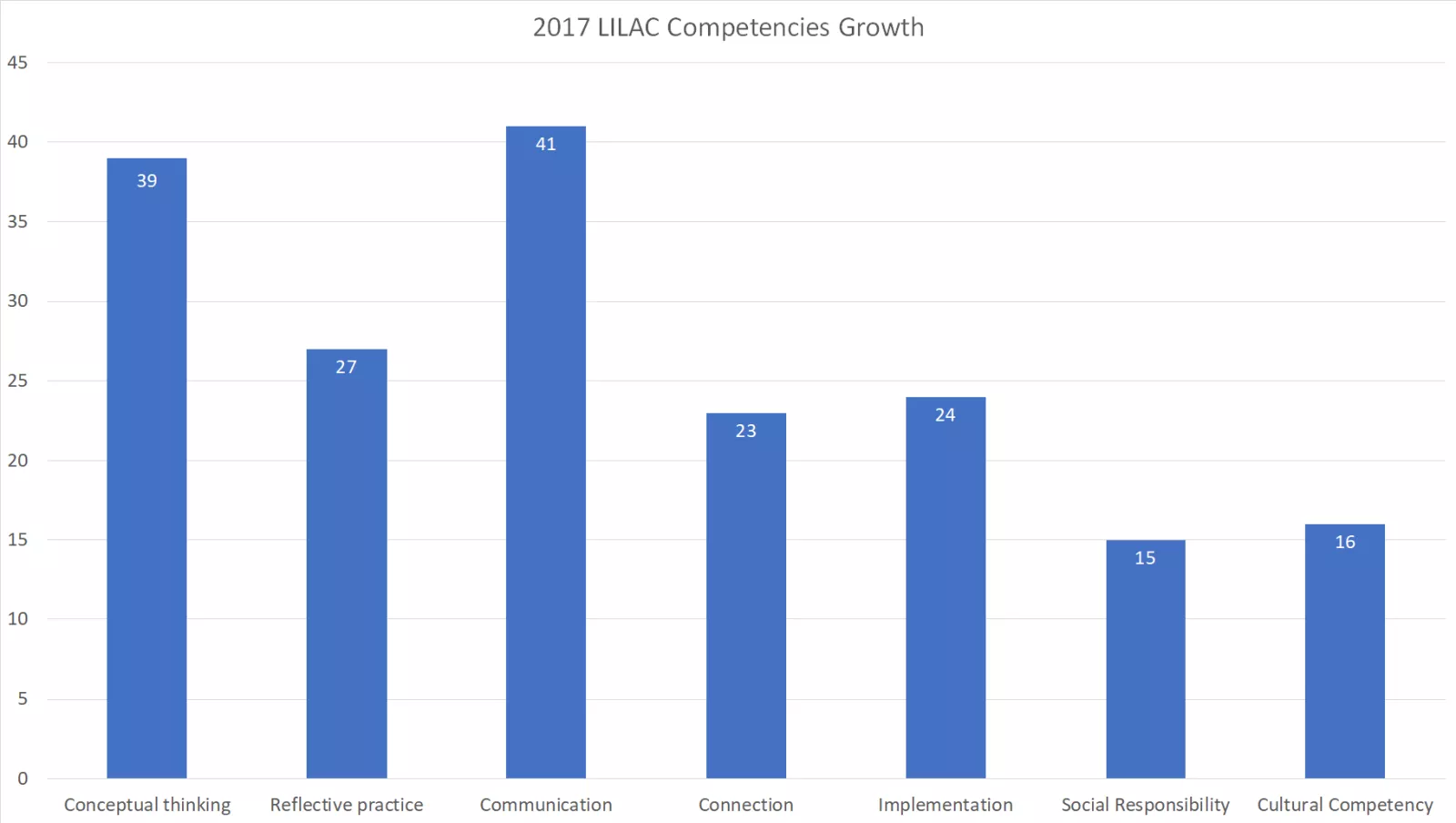Bryn Mawr College's Digital Competencies Program helps students build the digital skills and critical perspectives on technology needed for success in the digital age.
Bryn Mawr College's Leadership, Innovation, and Liberal Arts Center (LILAC) provides funding for student summer internship experiences. As part of that program in summer of 2017, all of the participants reflected on the competencies they developed as part of their summer work. Students presented posters explaining their internships and practiced talking about their experiences at an open session.
This summer, our LITS digital curriculum interns crunched the numbers to find out how the students responded, basing it off anonymous PDFs of student posters.
The 2017 Summer Digital Competencies
Students participating in the program picked the one digital competency which they developed the most. The top digital competencies students reported developing during their summer internships were:
- Data analysis: 16 students
- Strategic web and database searching: 9 students
- Cleaning, organizing, and managing data: 8 students
- Digital writing and publishing: 7 students
- Critical data visualization: 7 students
- Collaborative communication: 6 students
- Project management: 6 students
We noticed a strong emphasis in these results on the data categories (Data Management and Preservation and Data Analysis and Presentation), even though student internships were in widely divergent fields. This fits with a recent surge of interest we've seen in data among Bryn Mawr students and in the job market more generally. Web skills also make a strong appearance in Strategic web and database searching and Digital writing and publishing.
Student also identified two LILAC Career Readiness competencies they developed over the course of the summer. The LILAC competencies are a set of seven areas deeply tied to LILAC's core mission, which is to help prepare liberal arts students to be effective, self-aware leaders in their chosen life pursuits. The competencies are defined as follows:
- Social Responsibility: Behaving ethically in relation to the groups and communities of which one is a part
- Communication: Articulation of thoughts and experiences to influence, inspire and explain
- Conceptual Thinking: Creative search for new ideas and solutions
- Connection: Establish authentic purposeful relationships and collaborate with others
- Cultural Competency: Engage respectfully with people of diverse identities and backgrounds in different contexts
- Implementation: Thoughtful translation of ideas and theories into action
- Reflective Practice: Intentionally synthesizing experiences, both successes and challenges, to make connections, explore meaning and inform future choice
Communication (41 students) and Conceptual thinking (39 students) were the main competencies areas identified by students, though all seven categories are significantly represented.
Our interns also looked at popular combinations of LILAC competencies reported by individual students, since students were asked to pick two competencies for their presentation. While these results don't account for the higher numbers of certain competencies, they do give us a window into the ways the competencies areas interact:
- Communication + Conceptual thinking: 11 students
- Social Responsibility + Communication: 8 students
- Conceptual thinking + Implementation: 7 students
- Communication + Connection: 7 students
- Communication + Reflective practice: 6 students
- Conceptual thinking + Reflective practice: 6 students
Communication and Conceptual thinking, the top skills, expectedly demonstrate a great deal of overlap with each other, and one of these skills appears in each of the combinations identified by our interns. Interestingly, over half of students mentioning Social Responsibility also mentioned Communication, pointing to the close linking of these skills, perhaps in non-profit contexts. Conceptual thinking appears with both Implementation and Reflective practice, suggesting that our students took the opportunity over the summer both to put their ideas into action and to reflect on the meaning of their decisions.
***
The practice of reflection is core to all Bryn Mawr College's competencies. The fact that students spent this time contemplating their learning, rethinking their experiences in different frameworks, and articulating what they learned to a broader audience is in many ways more significant than the individual responses. But this data, in combination with the narratives students created about their 2017 summer internship experiences, do provide insight into the experiences and skills developed by students last summer. Plus, this project also gave our interns the opportunity to stretch their own data analysis skills!
Many thanks to our Digital Curriculum interns Romy Dangol ('19) and Eun Soo Jang ('20) for all of their help with this analysis!

